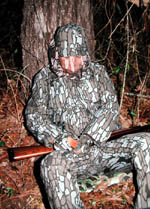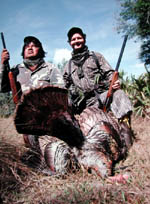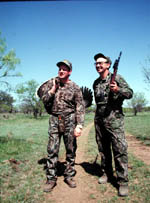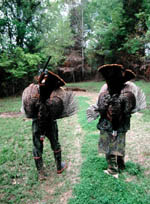
|
Features
|
|
|
|
Books
|
|
|
|
Fun & Games
|
|
|
|
Contact Us
|
|
|
John's Journal... Entry 192, Day 2
TIPS FROM DIXIE'S TOP TURKEY HUNTERS
Cecil Carder and Allen Jenkins
 EDITOR'S
NOTE: If you hunt turkeys in the South, you have
to deal with several subspecies of birds under different hunting conditions
and a wide variety of terrain. In ...
EDITOR'S
NOTE: If you hunt turkeys in the South, you have
to deal with several subspecies of birds under different hunting conditions
and a wide variety of terrain. In ...
* Florida, you'll hunt palmetto swamps and pastures,
* Virginia, you'll hunt the mountains and the valleys,
* Texas, you'll hunt arid desert lands,
* Mississippi and Louisiana, you'll hunt along flood plains,
* Alabama, you may hunt pine plantations,
* many sections of the country, you'll hunt crop lands and
* other regions you'll hunt in deep woods. To have success hunting turkeys
in the South, you must use many tactics and understand the differences
in the turkeys and the terrain you hunt. I've interviewed some of Dixie's
top turkey hunters to give you situations and strategies that will help
you take more toms this spring.
GO TO ARID PLACES WITH CECIL CARDER - A LONGTIME AVID TURKEY HUNTER
 Question:
Cecil, you've lived in Texas for many years, and how did you change your
hunting for turkeys when you first started hunting those desert-like lands?
Question:
Cecil, you've lived in Texas for many years, and how did you change your
hunting for turkeys when you first started hunting those desert-like lands?
Cecil Carder: When you hunt the Rio Grande gobbler in Texas, finding the
roost tree is the critical factor that determines whether you succeed
or fail. Because tall trees are at a premium in the flat arid land, you'll
often find more than one gobbler roosting together, where you do locate
a roost tree or several roost trees. When the turkeys fly from the roost,
they know where they're going. But they all may be flying in different
directions. However, once you take a stand along the trail the turkeys
use to go from the roost to where they plan to feed or water, bagging
a gobbler isn't too difficult. If I don't take a turkey at first light,
then I'll use locator calls to attempt to find a bird to hunt. A coyote
howler is a very productive locator call in the West. Once I've pinpointed
a bird, then I'll pick a stand that has plenty of cover behind me and
begin to call the bird.
 One
critical key to remember when you're hunting in Texas is that although
the state has plenty of fences, the turkeys often won't hang up when they
come to a fence like turkeys do in the East. When I know a gobbler is
on the opposite side of the fence from me, I'll take a stand 50 or 60
yards away from that fence and call the bird either over or under the
fence. Remember, turkeys can see from a long way off in the desert. Be
sure to take a stand far enough away that the tom can't spot you when
you start to call."
One
critical key to remember when you're hunting in Texas is that although
the state has plenty of fences, the turkeys often won't hang up when they
come to a fence like turkeys do in the East. When I know a gobbler is
on the opposite side of the fence from me, I'll take a stand 50 or 60
yards away from that fence and call the bird either over or under the
fence. Remember, turkeys can see from a long way off in the desert. Be
sure to take a stand far enough away that the tom can't spot you when
you start to call."
USE TRADITIONAL TURKEY-HUNTING METHODS WITH ALLEN JENKINS OF THOMASVILLE, GEORGIA, PRESIDENT OF LYNCH GAME CALLS:
Question: Why do you still use old-fashioned methods
of hunting turkeys, Allen, when there are so many new techniques available?
Allen Jenkins: "I believe too many hunters today scare more turkeys than
they take. Many hunters have adopted a run-and-gun philosophy that says
that if a turkey doesn't show up within 15 minutes after you call him,
then you need to move and try to go to him. But when the hunter moves,
he more than likely will spook the turkey. The sport of turkey hunting
is calling the bird to you -- making that bird come from where he is to
where you are. Turkeys have short legs and move slowly. So I call a little
and wait a lot. To me I win as a turkey hunter when I can make that gobbler
come to where I'm sitting.
 The
old style of turkey hunting is to yelp three times and then throw your
turkey caller away from you so that you can't get to it. Then you'll have
to wait on the bird. Sometimes I'll call more than three times but not
many more than three. I promise you that patience kills more turkeys than
fancy calling or running to turkeys will."
The
old style of turkey hunting is to yelp three times and then throw your
turkey caller away from you so that you can't get to it. Then you'll have
to wait on the bird. Sometimes I'll call more than three times but not
many more than three. I promise you that patience kills more turkeys than
fancy calling or running to turkeys will."
To learn more about John E. Phillips' turkey-hunting books, click here.
TOMORROW: BRAD HARRIS, DAVID HALE AND JIM CLAY
Check back each day this week for more about TIPS FROM DIXIE'S TOP TURKEY HUNTERS ...
Day 1 - Successful Turkey
Tactics with Eddie Salter
Day 2 - Cecil Carder and Allen Jenkins
Day 3 - Brad Harris, David Hale and Jim Clay
Day 4 - Ronnie Strickland
Day 5 - Jim Crumley and Preston Pittman